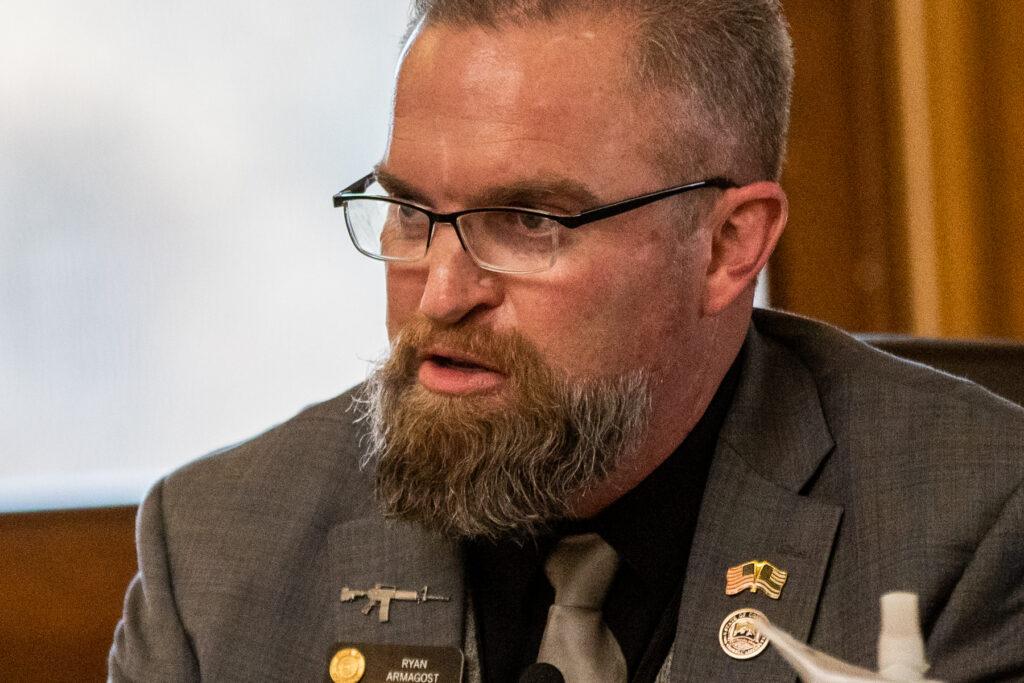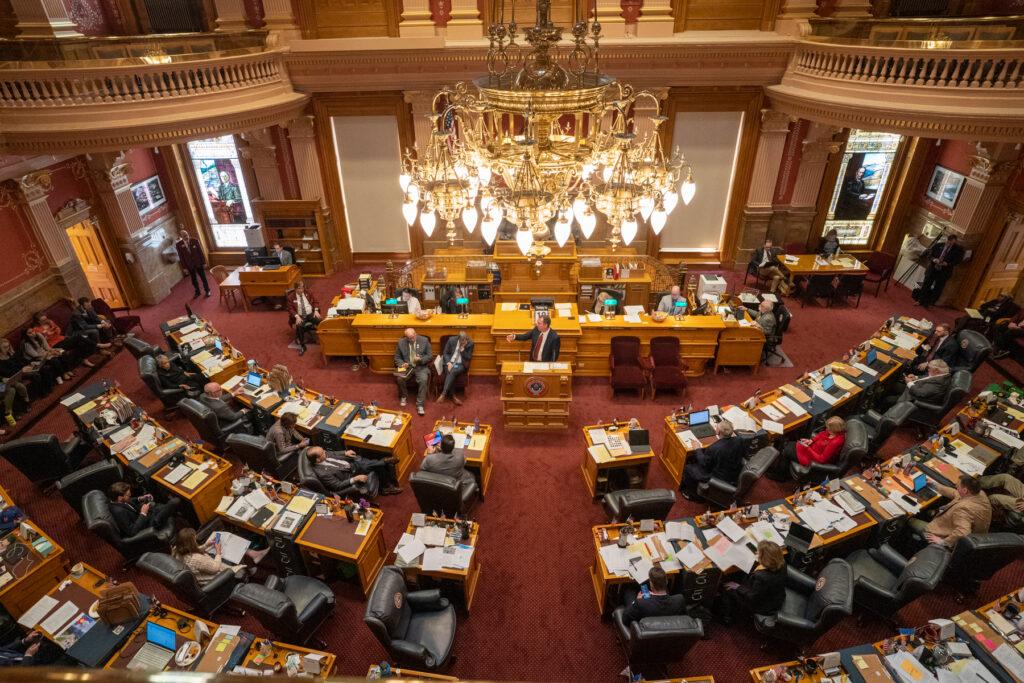
The Colorado House debated a series of gun bills for more than 30 hours in the state House between Friday and Sunday, one of the longest lawmaking marathons in recent memory.
That long debate — and the way it ended — could have repercussions for the rest of the legislative session.
Republicans spent much of the weekend blasting Democrats’ package of gun-law reforms. Democrats responded on Saturday by taking the rare step of limiting the time for debate. They enacted a rarely used power known as Rule 14.
“It's never a choice we want to make,” said House Speaker Pro Tem Chris deGruy Kennedy of Lakewood.
He said that it became clear over the weekend that Republicans were not interested in negotiating specific changes to the bills. Instead, he alleged, the Republican strategy was “about delaying and it was about stopping the majority of people elected by the voters of Colorado from doing what the voters sent us here to do.”
Republican members argue that it’s them and their voters who are being silenced.
“It was just incredibly disappointing for us because we still represent well over a million Coloradans who voted for Republicans who have valid concerns on these issues,” said Republican state Rep. Gabe Evans of Weld County.
The fallout from the confrontational weekend could affect the remaining six weeks of the lawmakers’ work this session. On Monday morning, the House again slowed to a crawl as Republicans requested that all of the bills up for a final vote be read at length, a delay tactic that can eat up hours, depending on the number of pages in the bill.
House Speaker Julie McCluskie also took a rare moment of personal privilege to rebuke a Republican member for his inflammatory rhetoric during the weekend’s debates, including calling Democrats "fascists."
Ambitious gun agenda sets the stage for legislative breakdown
Democrats are proposing a number of changes to gun laws, including:
- Increasing the minimum age for purchasing firearms to 21
- Expanding the list of people who can request that a judge temporarily remove someone’s guns
- Making it easier to sue firearm manufacturers
All three measures have already cleared the Democratic-controlled Senate and are close to passing the legislature. This weekend’s votes in the House were the final chance for sustained debate.
The House began this stretch of debate on Friday with a session that lasted about 10 hours. Early in the day, hundreds of Denver Public School students assembled in the Capitol to call for gun reforms following the shooting of two high school administrators. Saturday’s session lasted some 14 hours, with Democrats invoking Rule 14 late in the day. Sunday’s session was more than 9 hours long.
At times, the debate consisted of Republicans speaking for just a few minutes to raise specific questions about the policies, with Democrats responding. At others, it sounded more like a filibuster, as some Republican members read sections of the Constitution and lengthy texts about ‘red flag’ cases that had gone wrong.
By invoking Rule 14, Democrats capped the debating period for each bill to one hour. However, Republicans were still able to slow the process on Sunday by proposing amendments and requesting bill readings.
State Rep. Evans said he’s especially concerned that Democrats want to allow mental health professionals to file extreme risk protection orders. He worries that could discourage some people from getting help.
“Folks that ought to be getting care aren't going to be seeking that care because of the perception that something might happen,” he said.
He also said that rather than simply obstructing the process, delay tactics can buy time for negotiations behind the scenes. Another Republican, state Rep. Richard Holtorf, said that the parties had made progress on compromise amendments, only for Democrats to vote them down. However, several House Democrats countered that it was Republicans who broke the deals.
State Rep. Javier Mabrey is one of the main sponsors of Senate Bill 168. The proposal removes an immunity provision that prevents civil lawsuits against gun manufacturers and merchants, allowing people to sue if they believe those companies bear some responsibility for an act of gun violence.
He said he was willing to accept a Republican amendment that would have exempted companies that make accessories that don’t influence the deadliness of a weapon, such as holsters.
But he said that because Republicans wouldn’t stop delaying, he didn’t offer the amendment.

Republicans are claiming victory with another bill — the measure to raise the firearm purchase age.
The House amended it to allow those under 21 to possess a firearm — now they would only be restricted from buying one. Opponents had been concerned about how the possession element could affect teens on family farms and ranches, who might carry guns to deal with predators and pests.
Republican state Rep. Ron Weinberg of Loveland praised the Democratic sponsors, Majority Leader Monica Duran and state Rep. Eliza Hamrick, for making the change.
“We didn’t get everything we wanted, but we did get some pieces. Thank you again for all of your work. I urge a ‘no’ vote,” Weinberg said to laughter on Monday.
Like Weinberg, Republican state Rep. Lisa Frizell thanked Democrats on Monday for their ability to listen, even though she voted against the policy.
“It was at times extraordinarily painful because it was so raw and emotional,” she said of the weekend debates. “But we heard each other too. And to me that was incredibly powerful.”
Other Republicans were far more critical. On Sunday, state Rep. Scott Bottoms quoted the Bible and likened Democrats to fascists, saying that they aimed to suppress the opposition.
Addressing Democrats in the chamber, Bottoms said: “All you had to do was sit and listen, but you can’t do that, because listening to God, truth, righteousness and freedom actually hurts the soul of those who are not in favor of those mentalities.”
House Speaker McCluskie sharply rejected those remarks, saying they were inappropriate and unbecoming of the chamber.
As members of both parties — including Bottoms — stood at attention, she said: “We do not call members fascists. We do not comment on what is in one another's souls. We do not use religion to condemn one another. And we do not call others ungodly."
Extensive debates shape what lawmakers can get done
Under the state constitution, Colorado lawmakers can only meet for 120 days in their regular session. While there are six weeks left to go before that deadline, every bill that opponents choose to debate at length shortens the time remaining for everything else on the legislative calendar. And Republicans, frustrated with what they see as an aggressive Democratic agenda, have little incentive to avoid that.
“When you put too much food on your plate, what happens to the food? It falls off the plate,” said GOP state Rep. Holtorf. “We absolutely are foolish if we think all of these things can be addressed in 120 days, this session. Less is better.”
For Democrats, the counter move is to just let floor sessions keep going and work as many hours as it takes to move their legislation through.
“I think we gotta be ready to work every weekend. I think we need to be ready for a lot of nights,” Mabrey said.
He argued that limiting debate would help the state legislature avoid the gridlock that the filibuster has caused in the U.S. Congress.
“Governments do not function if the elected officials cannot be responsive,” he said.
Democratic state Rep. Karen McCormick of Longmont said that she’s fine debating 24 hours, day after day, for as long as it takes. But she worries about the toll these grueling hours will take on the capitol’s non-partisan staff.
“I really am concerned about the people that are not elected, that are here in the building,” McCormick said.

As their share of legislative seats has diminished, Republicans have turned increasingly to filibusters to make their objections known.
Last year they talked all night in an unsuccessful bid to derail a bill protecting access to abortion. While late-night debates on controversial bills are common at the statehouse, it was the first time in memory that such a fight stretched past sunrise.
But the tactic is proving more popular. Earlier in March, Republicans attempted to filibuster a measure to institute a three-day waiting period for gun purchases, and also a bill to let local governments set up supervised use sites for drug users, leading to overnight work.
While Democrats have talked about invoking Rule 14 before, this weekend was the first time they’ve used it. And some members worry the fallout could derail even unrelated work.
“I won't say that I'm not nervous about reactions to what we did, and I won't say that I'm not concerned that they might choose to have every single bill read at length,” deGruy Kennedy said.
(Asking for the entire text of a bill to be read out loud is a longstanding delay tactic protected by the state constitution.)
Democratic state Rep. Judy Amabile of Boulder called the decision to invoke Rule 14 a heavy one.
“I have a lot of respect for the institution and I don't want to see us do anything that harms it,” she said. “And it wasn't clear, it still isn't clear whether that turns out to be good or bad.”
What also wasn’t clear on Monday was whether the breakdown between House Republicans and Democrats will be temporary, or stretch through the rest of session.
In an email to supporters this weekend, the new head of the state GOP, former state Rep. Dave Williams, called on party members to make their objections known in person.
“From now to the end of session, we need all Republicans who have free time to go to the Capitol and make your voices heard,” Williams wrote in an email to supporters. “We need people calling, emailing, testifying, and protesting at the Capitol against the radical Democrats' corrupt agenda. Simply put ... we need you engaged.”
If Republican lawmakers dig in on delays, it could slow down a legislative calendar that still has many major Democratic priorities on it, including a package of abortion access bills and a controversial land-use reform that is a main focus for Gov. Jared Polis.









